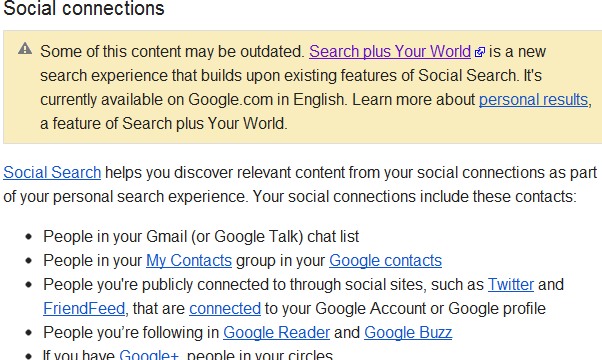 It seems that changes to online search happen so quickly now that the only permanent skill we need to have is the ability to be on top of the news.
It seems that changes to online search happen so quickly now that the only permanent skill we need to have is the ability to be on top of the news.
Google search is changing as we speak. Pretty much all of the available online “cheat-sheets” or guides to search are outdated. Even Google’s own help pages say “Some of this content may be outdated”, making it very confusing:
Here are some news that you may have missed. Nothing in the list below makes us happier when we search on Google; thus, the post title “Google-Minus”. I have included some advice, along with the listed changes, on how to keep control over your search results.
- Google search now shows personalized results -“Search plus Your World” – by default. As a researcher, you need to set your preferences to not using personal results. Log out of your gmail account as well.
- Instant search is the default. It slows us down; disable it in your preferences if you haven’t.
- New Google’s Privacy policy just went into effect on March 1,2012. This is nothing too scary but it means that Google unifies data collected about you across all of its services. As a result, your search might be affected by your use of any Google service, such as Calendar or youtube. Go onto your dashboard to control the data that is being collected.
- Google increasingly uses synonyms to “improve” your search experience. To control it and use keywords exactly as you have typed, use the quotation marks around the word(s) or the Verbatim option.
- The Advanced Search Dialog is harder to find, but it is still there for those who want to be guided. Unfortunately for “beginners”, it has just stopped showing the Boolean search string as you type keywords.
- The number of search results displayed is just as unreliable as it has been (why do they show the number? I have no idea). In some cases Google search now never shows the final number even if it’s smaller than 1,000.
- Google shows dynamic pages in its search results and often ranks them high. (I hope it will take care of the issue and fix this eventually.) Here is more detail in a past post: Excluding Junk Results From Search. To avoid this, you can use this search engine: No Junk Results.
That’s it for now. 🙂 (Google-plus, of course, provides a fantastic way to control search results for others, but that is not the current topic.)
There are signs of special characters being somewhat counted for when they are the first symbol in a search; I will report in detail in a future post.


Comments 5
Good stuff as always, Irina. Totally agree that it is a new skill set to have just keeping up with social media and browser settings- yikes!
Thank you for the heads up! Great topic for my weekly team training session. thanks!
You are always a big help! Thanks.
Thanks, you are always a big help!
Great post.